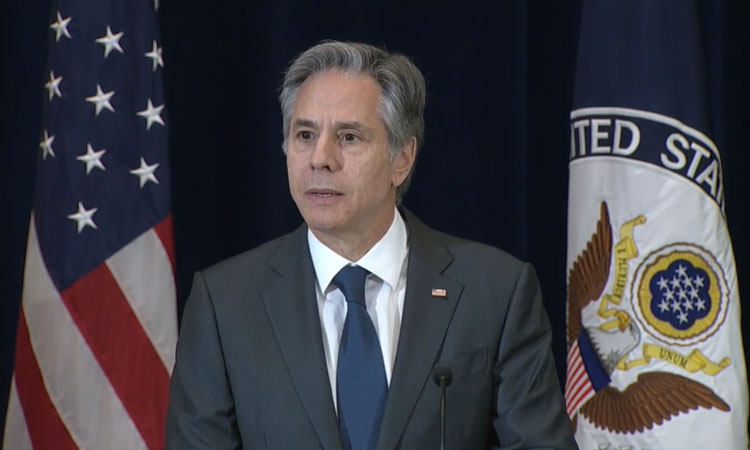Secretary Antony J. Blinken at the “The Status of Women is the Status of Democracy” event.

SECRETARY FLASHING: Well, good afternoon, everyone, and welcome to the State Department and welcome to the second Democracy Summit.
Jen, you for your distinguished leadership on the White House Gender Policy Council; to Kat, for yours here at the State Department on Global Women’s Issues: We could not have a better team, a more dynamic duo to lead our efforts. And I am grateful to each of you every day. Thank you very much. (Applause.)
So we will be joined in person and virtually by government leaders from around the world, as well as partners from across the United States government, multilateral organizations and civil society. Thank you very much. Thank you for all the work you do every day to advance women’s equality and therefore democracy. These two things, as you have already heard, are inextricably linked.
The President has long believed that active participation by all citizens, especially women and girls, strengthens democracies. And since day one, he has made promoting the civic and political engagement of women and girls the top priority of this administration. And that is why we are opening this session as one of the first events of the Summit – because the status of women is indeed the status of democracy.
We all know in this room and everyone who is listening to women’s rights in many parts of the world are threatened and attacked. Repressive governments pass targeted laws to restrict women’s fundamental freedoms, including freedom of expression and association. Extremist actors disproportionately target women and girls, particularly those with historically marginalized identities such as LGBTQI+ people, women from racial, ethnic and religious communities.
But it is not only in autocracies that women are denied their full and equal rights. In far too many parts of the world, women and girls still do not have the same opportunities to study and work. Journalists, lawyers, politicians and others face ongoing online harassment and abuse. Women who are victims of violence often do not have equal access to justice. Women face discrimination that often puts them at a disadvantage — whether through double standards in the workplace, access to reproductive rights, or citizenship laws that can create barriers to access education, health care, property, and for their families.
But in the face of these forces, women and girls are leading the fight for their rights and for human rights and democracy around the world. And they demonstrate how important it is to have women at the decision-making table.
In Afghanistan, despite the Taliban’s daily efforts to eradicate them from everyday life, women continue to protest. They still find ways to document human rights violations. They are still fighting for a better future for their country.
In Iran, brave women march through the streets under great threat to demand “Woman, Life and Freedom”.
The United States stands in solidarity with these women and all those working for women’s full, free, and equal participation around the world. Through our diplomacy, we are committed to supporting them and advancing gender equality around the world.
At the last Summit for Democracy, the United States launched our program, Support Her Empowerment – Women’s Inclusion in New Security, or SHE WINS, as the acronym aptly puts it. This initiative, which supports local women and women-led civil society organizations, works to increase women’s political and civil society participation in Cameroon, Central African Republic, Democratic Republic of the Congo, Papua New Guinea, Uzbekistan and Yemen.
In partnership with Denmark, we also lead the Global Partnership for Action against Gender-Based Harassment and Abuse Online, a 12-country coalition focused on tackling technology-enhanced gender-based violence.
You’ll soon be hearing from leaders like Poomzeelay Van Damme, a former South African parliamentarian who has shared her experience of being a victim of online harassment – and who is now working to combat this scourge, including as part of the Advisory Group to the Global Partnership.
We are encouraged by the early progress of the global partnership over the past year. We have seen some member countries increase resources to address this issue at home, including by providing more training for people in the legal and judicial systems, as well as for advocates working with online harassment survivors. And it’s so vital that their voices are heard and fully influence our efforts. Others are beginning to collect data to better measure online abuse and its impact. And overall, the Global Partnership has worked to build consensus on common principles to better identify, prevent and address this pressing issue in places from the G7 to the United Nations.
So today is an opportunity for us to recognize some of those achievements, but also – also – to recommit ourselves to the work that lies ahead to advance gender equality.
When we succeed, we’re not only doing what’s right, we’re also doing what’s smart and necessary to make our countries more prosperous, make them safer, and make them a little bit more empowering for all of our citizens. With the group gathered here, we have everything we need to move forward toward what is an absolutely necessary goal for us.
So to each of you who are here today, to each of you listening, thank you again for what you do each day to move this agenda forward. And thank you for helping us launch the Summit for Democracy. Again, what we’re doing here today, what we’re going to do over the next few days, these are fully connected. And I can think of no more fitting, no more important way to open the summit than with all of you here today.
So welcome to the State Department. I look forward to great discussions. Thank you all. Thank you very much. (Applause.)

